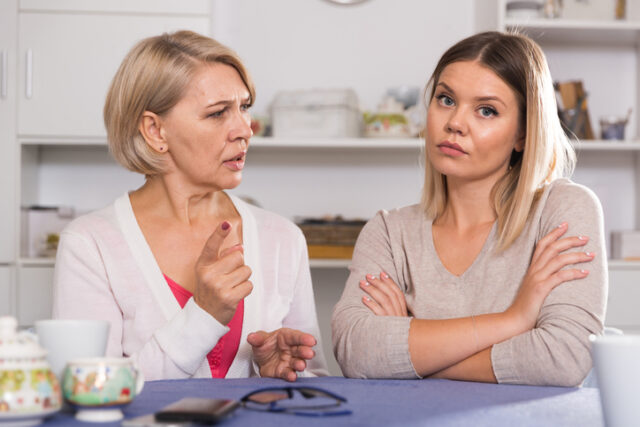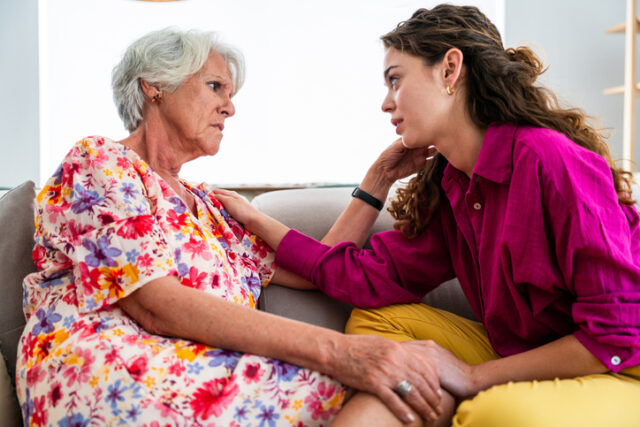There’s a deeply rooted sense of loyalty many people carry when it comes to their parents.

It makes sense, of course. You want to protect them from hard truths, even when those truths have shaped their entire lives. Of course, that doesn’t help either of you. Sometimes radical honesty can not only set you free, but it can bring you closer to the people who raised you. Most people aren’t willing to be that brave, but if that filter ever dropped, here’s what some adults might finally admit out loud.
1. “You hurt me more than you realise.”

Not all hurt comes from explosive moments. Sometimes it’s the years of being dismissed, ignored, or judged that stack up into something heavier than anyone wants to admit. Many adults never say it, but they carry the emotional weight of their parents’ choices into every relationship, every job, every version of themselves.
It’s hard to confront the idea that the people who raised you were also the ones who shaped your deepest insecurities. Saying this out loud would mean finally prioritising your own reality over their comfort, and for some, that feels disloyal. But it also might be the first step toward honesty and healing.
2. “I was scared of you.”

Not “strict,” not “firm,” just genuinely scary. Some adults grew up in households where silence was safer than speaking, where every slammed cupboard or sigh could set off something unpredictable. That fear doesn’t disappear just because you move out or grow older.
Admitting this out loud means calling out something many parents never saw as harmful. It means finally putting words to the nervous system damage, the people-pleasing tendencies, the anxiety that still shows up in adulthood. It’s a truth that might hurt to hear, but it’s even harder to keep pretending it wasn’t real.
3. “You weren’t emotionally available.”

A roof over your head and food on the table doesn’t make up for years of feeling emotionally alone. Some parents were physically present but emotionally distant, unable or unwilling to engage with anything that looked like vulnerability.
Many adults tiptoe around this because they don’t want to seem ungrateful. But the truth is, having to raise yourself emotionally leaves a mark. And saying this out loud might be less about blame and more about finally being honest about what was missing.
4. “You made me responsible for your happiness.”

Some parents lean on their kids in ways that feel flattering at first—“You’re the only one who understands me” or “I don’t know what I’d do without you.” However, eventually, that turns into emotional labour that no child should have to carry.
As adults, it can take years to unravel that sense of responsibility. You might still feel guilty for setting boundaries or living your own life. Saying this truth out loud would mean naming the unfair dynamic for what it was: emotional enmeshment that blurred all the lines.
5. “I needed protection, not pressure.”

Some kids were expected to grow up too fast—taking care of younger siblings, managing adult emotions, or being the “mature one” during conflict. And yet, they were still just kids who needed safety and guidance.
It’s hard to tell your parents they failed to protect you when they were busy expecting you to protect them. But for many adults, this truth has been waiting in the wings for years. It’s not about rehashing the past, though. It’s about acknowledging that you were forced into roles that never let you feel safe.
6. “I still crave your approval, and I hate that I do.”

This one hits deep. Even when adults know their parents are flawed or unfair, there’s often a lingering need to be seen, understood, and accepted. It doesn’t go away just because you’ve built your own life. Admitting this out loud feels embarrassing, like a weakness you should’ve grown out of. However, it’s not weakness—it’s a leftover survival instinct. Naming it might finally give that craving a bit less power.
7. “You made me feel like I wasn’t enough.”

Whether it was the constant comparisons, the backhanded compliments, or the “you can do better” remarks—some parents left their kids feeling permanently less-than. That message sinks in early, and it’s hard to shake off. Even in adulthood, you might still hear that voice in your head when something goes wrong. Saying this to your parents might feel brutal, but it’s also the kind of truth that could finally start to rewrite the internal script.
8. “You never really knew me.”

So many adults realise one day that their parents only ever knew the version of them that played it safe. The one that kept quiet, smiled, and didn’t rock the boat. The real self—the messy, passionate, honest one—was hidden away for survival. Letting that truth surface can feel both painful and freeing. It means grieving the connection you never got, while also giving yourself permission to be known, maybe for the first time, by people who actually see you.
9. “You judged me instead of helping me.”

Whether it was struggling with mental health, finances, relationships, or identity—some parents reacted with criticism instead of support. That judgement still echoes years later, making it hard to trust or open up, even to yourself. Bringing this up now might seem pointless. But voicing it could be a way of reclaiming your right to be supported without being shamed. It’s not about changing them; it’s about no longer protecting them from how they made you feel.
10. “You expected perfection but gave me inconsistency.”

Some parents held their kids to impossible standards while being inconsistent or unstable themselves. That double standard creates confusion that sticks around long after childhood ends. Saying this might finally highlight the hypocrisy you weren’t allowed to point out as a kid. You’re not interested in scoring points—you’re telling the full story, not just the version that kept everyone else comfortable.
11. “I adapted in ways that weren’t good for me.”

Many adults realise they developed survival skills that don’t serve them anymore—overthinking, people-pleasing, staying quiet to avoid conflict. Those patterns often started at home, shaped by the environment their parents created. Naming that origin doesn’t mean living in the past. It just means tracing the path honestly, without pretending you became this way in a vacuum. Sometimes the truth is the first step toward actually changing those patterns.
12. “I don’t feel safe being honest with you.”

There’s a deep sadness that comes with this one. Wanting to be close to your parents but knowing your honesty would be met with anger, defensiveness, or guilt-tripping is a lonely kind of grief. For many adults, this is the core reason they protect their parents from the truth. The thing is, speaking it—even quietly, even just to yourself—can be a way of choosing your own emotional safety over their illusions.
13. “I don’t owe you silence anymore.”

Some parents rely on their adult children to keep family secrets, protect reputations, and carry the weight of not making a scene. But silence has a cost, and some people have been paying it for years. Breaking that silence might come with backlash, but it also comes with freedom. Saying this truth out loud is a way of reminding yourself that your voice matters, even if it’s inconvenient to other people.
14. “I love you, but I also resent you.”

These two things can exist at the same time. Love for what was good, and resentment for what wasn’t. But most people have been taught to pick one or the other, and that’s where the silence begins. Admitting this doesn’t make you a bad person. It makes you an honest one. And sometimes, honesty is what finally clears the fog between you and the life you’re trying to live.
15. “You shaped me, but I get to decide who I become.”

At some point, every adult realises they can’t keep waiting for their parents to change. What they can do is stop carrying the weight of unspoken truths. They can name what hurt, acknowledge what was missing, and choose what comes next. That doesn’t always mean cutting ties. Sometimes, it just means drawing clearer lines. Letting your life be yours. And refusing to keep shrinking just to protect someone else from your truth.




